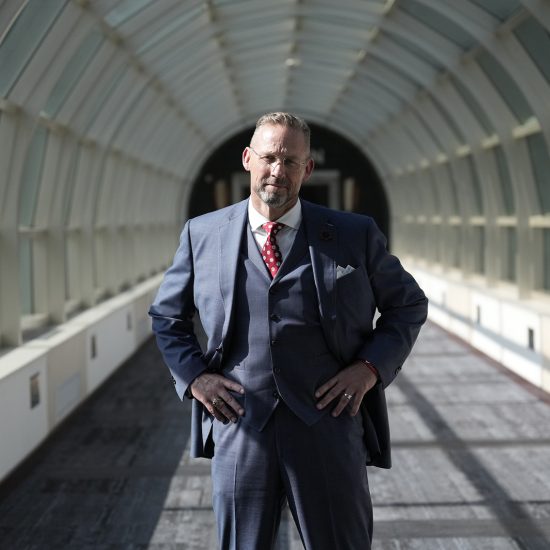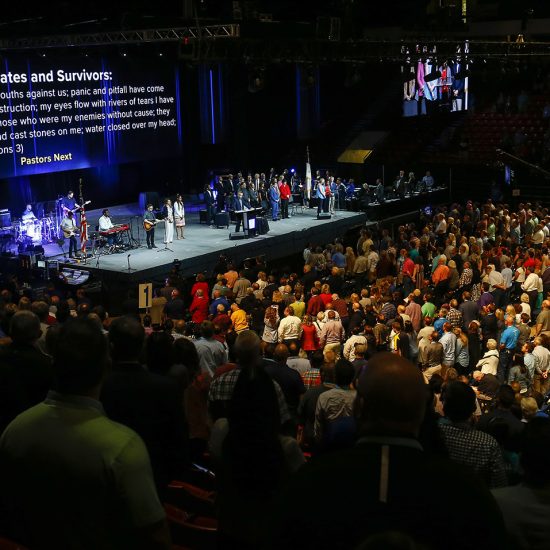
(RNS) — On Wednesday (Jan. 20), before the scattered chairs on the National Mall had even been collected, Tony Perkins, president of the Family Research Council, ominously warned his conservative Christian followers that President Joe Biden and his Democratic cronies would lead America to “new levels of radicalism” in which Christians would be persecuted and liberals would be “canceling anyone who disagrees.”
“President Biden is adamant that the hallmark of his administration will be tearing down thousands of years of human history, morality, science, and gender norms,” Perkins wrote.
Robert Jeffress, senior pastor at First Baptist Dallas and one of former President Donald Trump’s advisers, had already sounded an alarm the previous Sunday in a sermon that predicted “savage times” in which “society begins to disintegrate.” He too prepared faithful Christians for increased “persecution” from the government.
On former Arkansas Gov. Mike Huckabee’s talk show, evangelist Franklin Graham agreed, bemoaning the Democrat’s dystopian plan: “No question, Governor, the country is going to go through a very spiritually dark period of time.”

President Joe Biden waits to sign his first executive order in the Oval Office of the White House in Washington, D.C., on Jan. 20, 2021. (Evan Vucci/Associated Press)
One might almost want to congratulate the supposed author of this mayhem for his sheer ambition, were it not that Biden’s agenda for his first 100 days largely eschews culture war issues in favor of concerns that he shares with many White evangelicals. With a few exceptions, the president’s list of priorities matches up nicely with, if not Perkins, Jeffress, and Graham’s, then perfectly orthodox organizations such as World Relief and the National Association of Evangelicals.
Take immigration reform. A majority of religious Americans, including 55% of White evangelicals, agree “undocumented immigrants should have the chance to become U.S. citizens.” Lucky for them, Biden has proposed a comprehensive immigration reform bill that includes a pathway to citizenship.
Biden’s plan doesn’t come close to resembling the kind of laissez-faire “open borders” approach that conservative critics have predicted. Instead it includes improved border security via technology upgrades to reduce unlawful crossings. One prominent feature of the Biden bill is its protections for so-called Dreamers, a measure supported by 52% of evangelicals.
Frankly, taken point-by-point, the president’s proposal feels like a knockoff of the Evangelical Immigration Table, a coalition whose members include the National Latino Evangelical Coalition, the Council for Christian Colleges and Universities and even the Southern Baptists. Not exactly a roster of progressive radicals.
The Ethics and Religious Liberty Commission of the Southern Baptist Convention and World Relief, to judge from their previous proposals, will likely be pleased by Biden’s announcement that he plans to raise the annual refugee admissions ceiling by more than 100,000 after the Trump administration decimated the refugee resettlement system.
Biden’s approach is also a matter of religious liberty, about which people of faith are rightly concerned. Open Doors USA, a conservative organization that tracks Christian persecution around the world, released a report last year demonstrating how Trump’s historically low refugee ceiling had actually harmed persecuted Christians and other religious minorities. Biden’s approach reopens a path to safety for the estimated 13 Christians who are murdered each day for their faith, as well as other religious minorities facing religion-based discrimination and violence.
Not everything the president’s proposed will thrill evangelical Christians or other conservative Americans. He has promised action on climate change, an issue over which evangelicals are at best passionately divided. He reversed Trump’s ban on transgender people in the military.
But though Biden’s abortion policy will likely track with the Democrats’ liberal stance, his personal track record on the issue doesn’t suggest that he’ll wage any crusade of his own devising. Nor has Biden, a regular churchgoer, shown signs of going after tax exemptions for houses of worship, or canceling Christmas just to stick it to baby Jesus.
Biden’s plans for America’s families might be best judged by his immediate attention to providing relief for those who’ve been devastated by the coronavirus pandemic. The administration has set a goal of reopening most U.S. schools in his first 100 days, which if done safely could be the best thing working moms and dads have heard in a year. Most controversially perhaps for some small-government-minded evangelicals is that Biden is urging, though not mandating, that Americans wear masks to slow the virus’s spread.
But the most radical legislation the president has put forward advocates for emergency paid family leave. How radical? The bill’s language is almost identical to a proposal drafted by the National Association of Evangelicals last summer.
Biden will never win over the staunchest partisan activists who maintain a financial interest in wedge issues, nor should he try. The cadre of evangelical opportunists who spent the last four years jockeying for a seat at Trump’s table, and that includes Perkins, Jeffress, Graham, and even Paula White’s African Angels, will likely continue to attack Biden’s every move in hopes of wallpapering over their own shame.
In so doing, they remind all watching that they are actually the radical ones.






